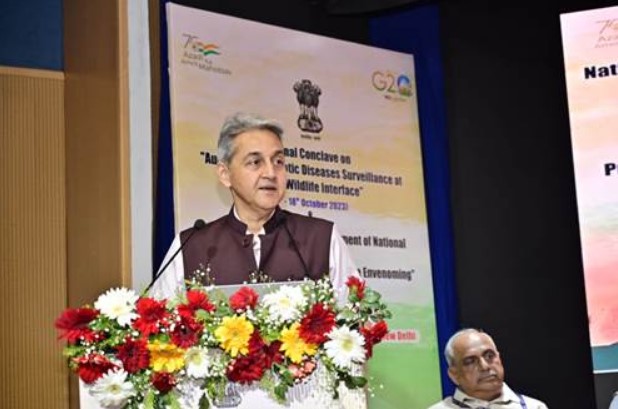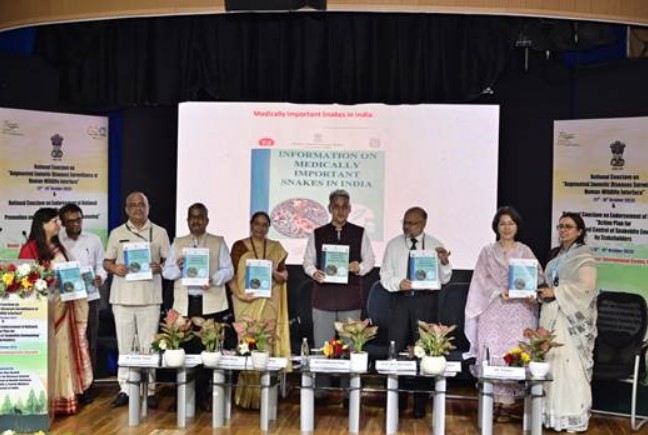“Zoonotic disease is one of the areas of concern which is affecting the humans as well as the animal health. 75% of newly emerging infectious diseases that have affected people over last three decades are zoonotic in nature. The limited knowledge and skill to identify zoonotic diseases, coupled with limited diagnostic facilities at all levels has resulted in neglect of the infectious diseases due to zoonotic pathogens.” This was stated by Union Health Secretary, Shri Sudhansh Pant while delivering the keynote address at the National Conclave on “Augmented Zoonotic Diseases Surveillance at Human – Wildlife Interface” and National Conclave for Endorsement of “National Action Plan for Prevention and Control of Snakebite Envenoming” to Stakeholders, organized by Centre for One Health, National Centre for Disease Control (NCDC), here today. He was also joined by Dr. Atul Goel, Director General of Health Services; Smt. R Jaya, Addl. Secretary, Ministry of Tribal Affairs; Dr Ashok Kumar, Asst. DG (Animal Health), Indian Council of Agricultural Research (ICAR); Dr Abhijit Mitra, Commissioner Animal Husbandry, Ministry of Fisheries, Animal Husbandry and Dairying, Dr. Payden, Deputy WHO Representative to India; Dr Simmi Tiwari, Joint Director and Head-COH, NCDC and Dr Ajit Shewale, Deputy Director, COH NCDC.

Addressing the gathering, Shri Sudhansh Pant stated that “a better understanding of the specific drivers and mechanisms of zoonotic disease is crucial to preparing for future disease outbreaks.” Underlining the impact of the recent COVID-19 pandemic, he said that “it is important to address diseases from both human and animal perspective as most emerging infectious diseases are a result of changing human-animal interface and their shared environment. This interconnectedness highlighted the need for a One Health approach, which helps in leveraging the complementarity and strengths that is inherent in each sector and devise integrated, robust and agile response systems.”
The Union Health Secretary noted that besides the emergence of zoonotic diseases, Anti-Microbial Resistance (AMR) has also emerged as a significant threat globally. He stated that “the rapid spread of multi‐drug resistant bacteria and lack of new antibiotics to treat infections caused by newer & more potent antimicrobial agents like Carbapenems pose a rapidly increasing threat to human health which urgently needs to be addressed.” “Similarly, food borne diseases which can be caused by poor hygiene, availability of antimicrobials, environmental contamination, and animal husbandry malpractices on farms, such as misuse of antibiotics also constitute a significant threat”, he further stated.

In light of these new and emerging health threats, the Union Health Secretary underscored the importance of ‘One Health’ approach which was reiterated under India’s G20 Presidency theme of ‘One Earth, One Family, One Future’ by hon’ble Prime Minister, Shri Narendra Modi.
Highlighting the various “One Health” efforts undertaken by the Govt of India, he said that the NCDC through its various technical divisions, IDSP, AMR, Climate change and Centre for One Health are entrusted to undertake activities pertaining to pandemic preparedness likely to emerge from zoonotic threats at human, animal and environment interface. “The Union Health Ministry is already implementing various national programs through NCDC which includes National One Health Programs for Prevention and Control of Zoonoses (NOHPPCZ), National Rabies Control Programs (NRCP), Program for Prevention and Control of Leptospirosis (PPCL), Snake Bite Prevention and Control (SBPC), National Programme on AMR Containment, National programme on Climate Change and Human Health (NPCHH). For zoonosis, ICMR and ICAR have developed collaboration for joint research priorities. Ministry of Science and Technology has proposed to have a One Health roadmap for India with the Ministries of Health, Agriculture and Environment, Forest and Climate Change and the FSSAI have taken several initiatives under Swasth Bharat initiative for generating community awareness on eating habits of people. NDMA and Ministry of Health are working on preparation and implementation of action plans on climate change related events. India is also establishing a One Health Centre of Excellence in Nagpur, to focus on One Health Research under ICMR”, he further stated.
Shri Sudhansh Pant also underlined that snakebite envenoming is life threating condition and is an issue of public health concern as India shares a major burden of this disease. “It is important to have a dedicated framework to address the issues and challenges of snakebite envenoming at National level”, he said.

During the event, the dignitaries endorsed the Inter – Ministerial One Health Support Statement on “National Action Plan for Prevention and Control of Snakebite Envenoming”. Technical Documents on Rabies Helpline, Information on Medically Important Snakes in India and Zoonotic Diseases Prevention, Preparedness and Response were also launched on the occasion.
Underscoring the importance of ‘One Health’ approach, Dr. Atul Goel emphasized that the concept encompasses not only animals but plants as well. He highlighted that the spillover effects of zoonotic diseases are due to increasing human encroachment in nature.
Dr Ashok Kumar emphasized that it is essential to ensure early detection of diseases under the ‘One Health’ approach so that spillover effects from animals to humans or vice versa can be effectively managed. He highlighted that ICAR is collaborating with various institutions at the inter-ministerial level on research and
Smt. R Jaya stated that the ‘One Health’ approach naturally flow from the philosophy of Vasudhaiva Kutumbakam. She underlined that community mobilization and spreading awareness are important contributions that the Ministry of Tribal Affairs will work towards in supporting the ‘One Health’ framework.